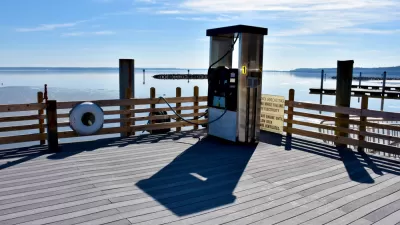New Jersey's transportation trust fund is so broke that by next fiscal year, all of it will go toward debt payments. Democratic Assembly Deputy Speaker John S. Wisniewski's legislation would increase the petroleum tax paid by gasoline distributors.
If Wisniewski (D-Middlesex), chair of the Assembly Transportation Committee, has his way, the state's 14.5-cent gas tax, unchanged since 1988 and lowest in the nation after Alaska, could jump as much as 25 cents.
According to CityLab's Eric Jaffe, Garden State motorists pay only a penny when adjusted for inflation, "(a)bout half as much as they did in 1927...when the state first levied a gas tax."
Though 25-cents would be the highest increase of any state (Wyoming's 2013 increase was 10-cents), the 39.5-cent tax would only bring New Jersey to eighth highest [PDF] in the nation. Neighboring New York, at 50.5 cents, has the nation's highest.
Wisniewski's legislation was discussed at a meeting on Thursday of the Assembly Transportation and Independent Authorities Committee "for the first time since its chairman proposed hiking the state gas tax by nearly $300 a year for the average motorist," writes Steve Strunsky of NJ Advance Media for NJ.com.
Wisniewski's bill would not change the state motor fuels tax, 10.5-cent-per-gallon levy on retail purchases of gasoline by motorists at the pump all of which -- or $516 million in the current fiscal year -- is dedicated to the trust fund.
Rather, it is directed at the additional "4 cents per gallon on wholesale purchases of gasoline (paid) by distributors at refineries," writes Strunsky on what is known as "the state's petroleum products gross receipts tax." It would increase the "annual minimum of $200 million of the proceeds of the petroleum tax (that) is now constitutionally dedicated to the trust fund... to $1.45 billion, for a $1.25 billion increase in trust fund revenues."
The legislation would not only raise the petroleum tax, it would change the way it is calculated. Instead of straight cents-per-gallon formula, the bill would charge distributors 9 percent of the retail price of gasoline. Revenues under the new calculation could rise with rising gas prices, but the bill sets August 2014 gas prices as a minimum baseline for calculating the tax, guarding against fall prices.
That works out to 29 cents per gallon -- a 25-cent increase -- based on the August average price of $3.30 a gallon, according to newjerseygasprices.com.
The meeting in Camden "was the third of four hearings scheduled on the state's transportation-funding crisis," writes Andrew Seidman of the Philadelphia Inquirer.
The legislation faces many challenges, not the least of which is public opinion. Readers may recall that in Massachusetts, which raised it's gas tax by three cents and indexed it to inflation last year, saw angry voters repeal the indexing feature last Tuesday.
And then there is Gov. Chris Christie, considered to be a potential Republican presidential contender in 2016. While "Gov. Christie has said all options were on the table to replenish the fund," writes Seidman, he notes that "he has generally opposed tax increases."
According to a press release from Assembly Deputy Speaker Wisniewski, "The next and final committee hearing is set for Thursday, November 20th at 9 a.m. at the League of Municipalities Convention at the Atlantic City Convention Center."
[Hat tips to Politico Morning Transportation and AASHTO Daily Transportation Update]
FULL STORY: N.J. gas tax would rise nearly $300 a year for average driver under bill to fix roads, rails and bridges

Planetizen Federal Action Tracker
A weekly monitor of how Trump’s orders and actions are impacting planners and planning in America.

Congressman Proposes Bill to Rename DC Metro “Trump Train”
The Make Autorail Great Again Act would withhold federal funding to the system until the Washington Metropolitan Area Transit Authority (WMATA), rebrands as the Washington Metropolitan Authority for Greater Access (WMAGA).

The Simple Legislative Tool Transforming Vacant Downtowns
In California, Michigan and Georgia, an easy win is bringing dollars — and delight — back to city centers.

Albuquerque’s Microtransit: A Planner’s Answer to Food Access Gaps
New microtransit vans in Albuquerque aim to close food access gaps by linking low-income areas to grocery stores, cutting travel times by 30 percent and offering planners a scalable model for equity-focused transit.

This City Will Pay You to Meet Your Neighbors
A North Kansas City grant program offers up to $400 for residents to throw neighborhood block parties.

Commentary: Our Silence Will Not Protect Us
Keeping our heads down and our language inoffensive is not the right response to the times we’re in. Solidarity and courage is.
Urban Design for Planners 1: Software Tools
This six-course series explores essential urban design concepts using open source software and equips planners with the tools they need to participate fully in the urban design process.
Planning for Universal Design
Learn the tools for implementing Universal Design in planning regulations.
Smith Gee Studio
City of Charlotte
City of Camden Redevelopment Agency
City of Astoria
Transportation Research & Education Center (TREC) at Portland State University
US High Speed Rail Association
City of Camden Redevelopment Agency
Municipality of Princeton (NJ)




























